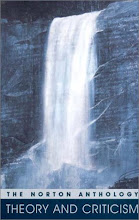
Recently, I read Ngugi's Devil On The Cross. Below I is a short essay in which I relate some of the text with some of the concepts of postcolonial criticism:
It’s the story of two families, one living with the legacy of colonialism, and the other basking in the largess of a new imperial power. The families lives, though very different, draw a definitive parallel. Anita Desai, in her novel, Fasting, Feasting, creates strict comparisons between an Indian and American middle-class family. She points to these comparisons through the stories of characters who are accustomed to particular ways of thinking and living largely shaped, respectively, by colonial and imperial ideology. In so doing, Desai brings light upon the negative realities present in both India and the United States. Desai shows that both colonizers and the colonized struggle in the balance between that which she terms fasting and feasting.
The story opens with the presentation of the colonized orthodox Indian family. The father is presented as a generally successful man who holds steadily to a consistent way of living. He has been impacted largely by changes brought to India by American colonizers. As the text explains, “his eyes had been opened to the benefits of meat along with that of cricket and the English language: the three were linked inextricably” (Desai 32). The mother, though largely submissive to her husband, as the two are named as one, MamaPapa, has never completely given way to the “novel concept of progress” (Desai 32). The two have three children; Uma, the eldest daughter is described as clumsy and slow, Aruna, the middle daughter described as beautiful and intelligent, and Arun is the only son whom the parents pour the hopes and dreams of their lives into, in an effort to become more eurocentistic.
The tension between fasting and feasting is shown in Uma in relation to the colonialism of the educational system. Uma, unlike her sister Aruna, is unable to get high marks in school, and therefore is essentially forced to withdraw from the highly selective system of education. That which she desires to feast upon, namely education, becomes that which she fasts upon. The tension between fasting and feasting is also found in relation to Uma’s experience with the Indian system for arranged marriages. Twice her family attempts to get her married, figuratively speaking, attempting to strive toward feasting but twice their attempts fail, and leave them fasting. In their first attempt a family cons Uma’s father into giving a dowry, but then breaks off the engagement. The second time Uma gets married, but finds that the man she married is already married, leading to the devastation, or fasting, of her divorce. The devastation of Uma’s life situations which have led her to fasting bring her to the place at which we meet her, as a gray-haired spinster, living under her parents rule. When Uma is given the potential to feast, as she is offered a job at a local hospital, her parents refuse to allow her to work there, leaving her to again fast. Even Uma’s moments of greatest feasting are marked by her oblivion or fasting such as when she succumbs to a fit in an ashram which her Aunt Mira-Masi has taken her to, or when she nearly drowns in the Ganges River during a religious ritual. Though Uma attempts to move toward feasting she is seemingly doomed by inevitable fasting. Uma is largely caught in the tension of syncretism between India and America.
Uma’s younger sister, Aruna, though beautiful and intelligent, is also struck by the tension between fasting and feasting. Aruna marries a man who is termed a “catch-prize” and moves to Bombay. For a time she appears to be feasting in her marital relationship, but even her feasting is short-lived. Her obligation to keep up with her appearance leads her into a mode of fasting. Furthermore, Aruna become neurotically obsessed with the need to keep both her children and her husband under her control at all times. Aruna portrays this idea that sometimes one’s seemingly blinded striving toward feasting only leads to fasting.
As the youngest child, and the only son, Arun’s parents have poured their resources into his intellectual nourishment. Arun is almost held as an object that has the potential to lead the family toward upward mobility. For this reason, the parents are feasting with joy when Arun is accepted to study at an American University. However, his parent’s response of feasting is contrasted with his own fasting. Uma speaks of her brother’s blank joylessness upon receiving word of his acceptance into the American University. Here we find the tension between fasting and feasting, even between members within the same family. Arun’s parents appear fixated on the hope of their son becoming educated, which shows that they have been influenced largely by the ideology of the imperialist’s power to convince them that upward mobility is equivalent to idealism. However, Arun remains more or less unconvinced of these colonial idealistic values.
Through Arun’s experience of moving to Boston and living with the American Patton family, we begin to view parallels between fasting and feasting in regard to the people of colonized India and the United States imperialist powers. The American Patton family symbolically represents feasting in regard to their excess. We find that the father is constantly barbequing large slabs of meat, and the mother is obsessed with restocking the family’s freezer. The daughter of this American family binges, or feasts and then fasts, on candy bars. As a victim suffering of bulimia, the daughter, Melanie, symbolically represents the ever-present tension between feasting and fasting as she consumes candy bars and then regurgitates them. We find the Patton family son, Rod, to be a jock, who is completely obsessed with his body image, constantly jogging, in an effort to work toward feasting upon the body image that he hopes to attain. Through the Patton family Arun witnesses the tension that both Indian and the United States have in relation to fasting and feasting. Specifically, Arun finds a strong correlation between his sister and Melanie and thinks, “How strange it is to encounter it here, where so much is given, where there is both license and plenty.” (Desai 214). Arun also says, “one can’t tell what is more dangerous in this country (America), the pursuit of health or of sickness.” (Desai 205).
The condition of both the Indian and American families portray the reality that people of both the United States and third world countries struggle with tensions associated with fasting and feasting. Often we are lead to believe that the United States, because it holds imperial power, is somehow superior to colonized countries, such as India. In Fasting, Feasting, we come to recognize that though the people in both countries struggle differently, they both struggle. There is an ongoing tension between the denial of one’s basic needs, and the denial of basic liberties, leading to the struggles related to fasting and feasting which, as we read in the novel, are present in families in India as well as the United States. Anita Desai, in Fasting,Feasting, shows that both the colonized and the colonizers are in a constant battle to escape imprisonment from the struggle between fasting and feasting.















